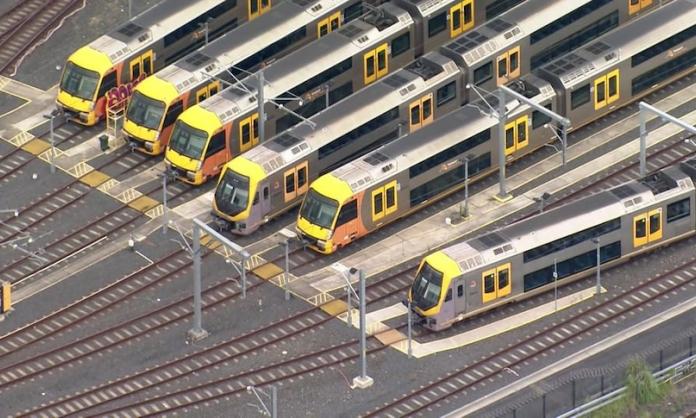In the early hours of Monday morning the NSW government shut down its own rail network, cancelling all services. Members of the Liberal Party quickly took to the airwaves to howl about a railway “strike” in a series of calculated public hysterics. NSW Transport minister David Elliott accused the rail union, the RTBU, of hijacking the city. “They cannot use the city’s transport system for some sort of terrorist-like activity”, he thundered.
Dominic Perrottet, the premier, amped up the anti-union rhetoric, claiming: “This is Labor and the unions in bed with each other causing mass chaos in our city”. Prime Minister Scott Morrison jumped on the opportunity to bash the union, accusing it of “carrying on” and warning that “it’s a foretaste of what to expect with licence from Labor”.
For the most part, the media dutifully reported government spin as fact and interviewed stranded commuters for sob stories. The truth is that the NSW government and Sydney Trains essentially locked out their workers. Not just train drivers, as the media obsessively focus on, but guards, signallers, station staff and cleaners.
There are two reasons for the lockout. The first is to fill the media with vicious attacks on railway workers and to help bring the year-long industrial dispute to a very public climax. They want railway workers to feel defensive about our demands for better pay and safety, and about the actions, including strikes, we have taken to try to win them. They think that today’s antics will put us on the back foot and force us to accept a shoddy deal.
The second is to demonstrate to the Fair Work Commission that the railway cannot function due to the RTBU’s industrial actions, and thus have those actions outlawed. Although no media outlet seems able to explain the course of events, the lead-up to the lockout was quite simple, consisting of a series of attempts by the government to use Fair Work to cancel our actions.
RTBU members had notified that we would be implementing a ban on overtime and that we would work according to the “master roster”, rather than accepting alterations and made-up shifts. The government complained to Fair Work, which looked likely to rule against the union. So the union pre-emptively stopped those actions, but continued with other minor activities, including work-to-rule (refusing to do the bosses any favours) and refusing to accept last-minute changes to our runs except in an emergency.
How ridiculous, then, is the insistence that services were pulled due to “safety concerns”, when all the union was doing was running to Sydney Trains’ own timetable and rules! The government, unsuccessful in its attempts to have all actions cancelled, is hoping that today’s stunt will quash our campaign for good.
This all underlines that the determinations of Fair Work have an outrageous power over unions; it could terminate all our industrial action or even force us to arbitration, and the court is by no means a neutral arbiter of industrial disputes. It is a bosses’ tool for disciplining the workers and unions. We have seen it play this role many times.
In 2018, Fair Work banned rail workers’ actions after an overtime ban and 24-hour strike was deemed too “disruptive” to the economy, i.e. the entire purpose of industrial action was used as a reason to prevent it. Today, the government has again run to the Commission, most likely to prevent us from taking any action at all.
The government’s actions are part of an attack on our democratic right to take industrial action to win better wages and conditions. In dictatorships, industrial action and unions are banned and incur severe punishments. In “democratic” Australia, industrial action is ruled illegal as soon as it starts to put pressure on the boss.
So how should the RTBU respond to the government’s provocation?
“We can’t back down in the face of a government temper tantrum”, said Damian, head driver delegate at Central depot. “We need to escalate our campaign. This is a government that’s locked out its workforce after dragging out an EA negotiation for nine months and imposing a pay freeze by stealth. Strikes and industrial actions are the only thing that will force them to deliver safety, a fair wage rise and respect for workers.”
What is lost in the media furore today is precisely these demands, which resonate across the public sector and have motivated nurses and teachers to strike in recent weeks. We need a reasonable pay rise to keep up with the increasing cost of living, not one below inflation that amounts to a pay cut. We need key safety measures to be implemented and retained, like guards on trains and COVID safety. We want conditions that improve our quality of life as shift workers.
In the likely event that Fair Work rules in favour of the government, the RTBU should be prepared to defy whatever bans are placed on our democratic right to take industrial action. While the chaos today was caused by the bosses’ lockout, railway workers have no reason to feel defensive about striking to win our demands. As workers whose labour keeps Sydney moving, our bargaining power is our ability to stop work and shut down the arteries of Australia’s biggest economy. The only times the government has felt pressured to concede anything is when we have taken such action. Despite all the drama today, that is still our best chance of winning our campaign for fair pay, safety and decent conditions.










